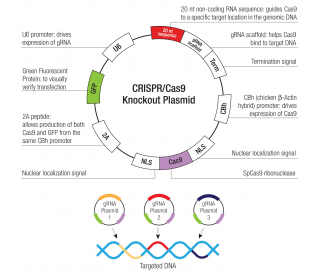Purity
>95%, by SDS-PAGE visualized with Silver Staining and quantitative densitometry by Coomassie® Blue Staining.
Endotoxin Level
<0.10 EU per 1 μg of the protein by the LAL method.
Activity
Measured by its binding ability in a functional ELISA. When Recombinant Cynomolgus Monkey GITR/TNFRSF18 Fc Chimera is immobilized at 0.5 μg/mL, 100 μL/well, the concentration of biotinylated recombinant human GITR Ligand/TNFSF18 that produces 50% of the optimal binding response is 8-40 ng/mL.
Source
Chinese Hamster Ovary cell line, CHO-derived
Cynomolgus Monkey GITR/TNFRSF18
(Gln20-Glu155)
Accession # XP_005545180IEGRMD Human IgG1
(Pro100-Lys330)N-terminus C-terminus Accession #
N-terminal Sequence
AnalysisNo results obtained. Gln20 inferred from enzymatic pyroglutamate treatment revealing Arg21
Structure / Form
Disulfide-linked homodimer
Predicted Molecular Mass
41 kDa
SDS-PAGE
49-60 kDa, reducing conditions
9428-GR |
| |
Formulation Lyophilized from a 0.2 μm filtered solution in PBS. | ||
Reconstitution Reconstitute at 500 μg/mL in PBS. | ||
Shipping The product is shipped at ambient temperature. Upon receipt, store it immediately at the temperature recommended below. | ||
Stability & Storage: Use a manual defrost freezer and avoid repeated freeze-thaw cycles.
|
Data Images
Bioactivity
| When Recombinant Cynomolgus Monkey GITR/TNFRSF18 Fc Chimera (Catalog # 9428‑GR) is immobilized at 0.5 µg/mL, biotinylated recombinant human GITRLigand/TNFSF18 binds with an ED50 of 8-40 ng/mL. |
Background: GITR/TNFRSF18
GITR (glucocorticoid-induced tumor necrosis factor receptor), also known as AITR and TNFRSF18, is a 40 kDa transmembrane glycoprotein that functions in immune regulation (1, 2). Mature human GITR consists of a 137 amino acid (aa) extracellular domain (ECD) with three tandem TNF R cysteine-rich repeats, a 21 aa transmembrane segment, and a 58 aa cytoplasmic domain (3, 4). Within the ECD region, cyno GITR shares 89.8% and 53.2% aa sequence identity with human and mouse GITR, respectively. Alternative splicing generates an isoform with a short deletion in the cytoplasmic domain and a potentially secreted isoform that is substituted within the third TNF R repeat and lacks the transmembrane and cytoplasmic regions. GITR is expressed on CD4 +CD25 + regulatory T cells (Treg) as well as on subsets of thymocytes, lymph node cells, and splenocytes (4-6), and it is up-regulated on antigen-activated conventional CD4 + and CD8 + T cells (3, 4, 6, 7). GITR binding by GITR Ligand/TNFSF18 co-stimulates the proliferation and activation of CD4 + or CD8 + conventional T cells (3, 7-9). It also induces the proliferation of Treg (8, 10) but inhibits the ability of Treg to suppress immune responses (5, 8, 11-13). This can result in the development of autoimmunity, increased tumor cell killing by effector T cells (5, 11), and increased inflammation in arthritis, allergic asthma, and inflammatory bowel disease (10, 14). GITR is also expressed on sympathetic neurons where it enhances NGF-induced neurite outgrowth and branching (15).
References:
Clouthier, D.L. and T.H. Watts (2014) Cytokine Growth Factor Rev. 25:91.
Ronchetti, S. et al. (2015) J. Immunol. Res. 2015:171520.
Gurney, A.L. et al. (1999) Curr. Biol. 9:215.
Kwon, B. et al. (1999) J. Biol. Chem. 274:6056.
Shimizu, J. et al. (2002) Nat. Immunol. 3:135.
Nocentini, G. et al. (1997) Proc. Natl. Acad. Sci. USA 94:6216.
Muriglan, S.J. et al. (2004) J. Exp. Med. 200:149.
Ronchetti, S. et al. (2004) Eur. J. Immunol. 34:613.
Tone, M. et al. (2003) Proc. Natl. Acad. Sci. USA 100:15059.
Ephrem, A. et al. (2013) Eur. J. Immunol. 43:2421.
Ko, K. et al. (2005) J. Exp. Med. 202:885.
Ji, H. et al. (2004) J. Immunol. 172:5823.
Stephens, G.L. et al. (2004) J. Immunol. 173:5008.
Patel, M. et al. (2005) Eur. J. Immunol. 35:3581.
O'Keeffe, G.W. et al. (2008) Nat. Neurosci. 11:135.
Long Name:
Glucocorticoid Induced TNF Receptor Family Related Gene
Entrez Gene IDs:
8784 (Human); 21936 (Mouse); 500598 (Rat); 102146362 (Cynomolgus Monkey)
Alternate Names:
Activation-inducible TNFR family receptor; AITR; AITRTNF receptor superfamily activation-inducible protein; CD357 antigen; CD357; GITR; GITR-D; GITRtumor necrosis factor receptor superfamily member 18; Glucocorticoid-induced TNFR-related protein; TNFRSF18; tumor necrosis factor receptor superfamily, member 18










